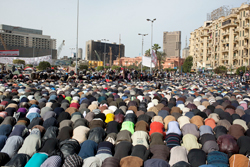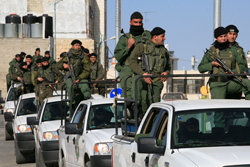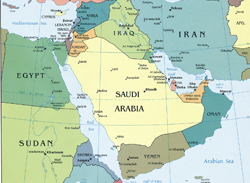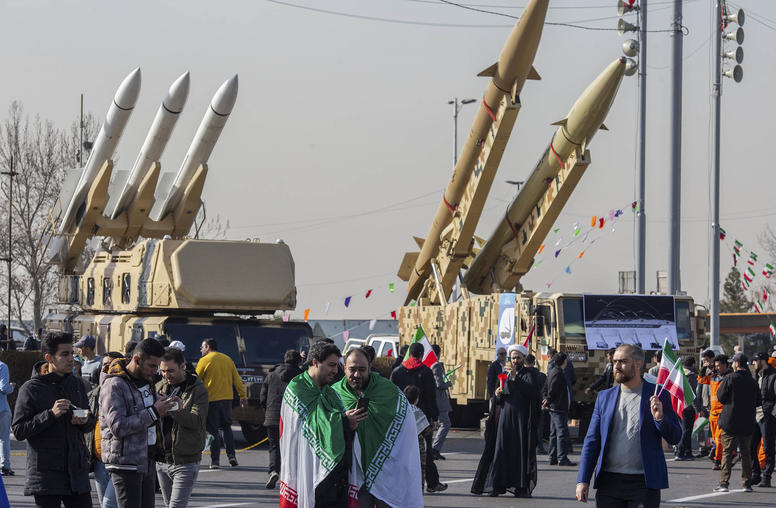Eye on Egypt and the Middle East
The U.S. Institute of Peace continues to follow the developments in Egypt and the Middle East. Read about USIP's work on Christian-Muslim relations in the Middle East, work on national security issues, democratization, and more.
February 4, 2011
The U.S. Institute of Peace continues to follow the developments in Egypt and the Middle East. Read about USIP's work on Christian-Muslim relations in the Middle East, work on national security issues, democratization, and more.
Read about USIP's work on:
- Religion in Egypt
- National Security
- USIP's Regional Work in the Middle East: Lebanon and Syrian-Israeli Relations
- Follow as USIP tracks the unfolding situation in Egypt with expert commentary and more
USIP's Work on Religion in Egypt
 Relations between Coptic Christians and Muslims in Egypt are among the major areas of work at the United States Institute of Peace which has been following these issues for decades. David Smock, senior vice president at USIP first began writing about these issues in the late 1990s, leading to the publication of his book, “Interfaith Dialogue and Peacebuilding ” by USIP Press in 2002. That same year Smock published a Special Report on “Islam and Democracy” as a by-product of a workshop co-sponsored with the Center for the Study of Islam and Democracy.
Relations between Coptic Christians and Muslims in Egypt are among the major areas of work at the United States Institute of Peace which has been following these issues for decades. David Smock, senior vice president at USIP first began writing about these issues in the late 1990s, leading to the publication of his book, “Interfaith Dialogue and Peacebuilding ” by USIP Press in 2002. That same year Smock published a Special Report on “Islam and Democracy” as a by-product of a workshop co-sponsored with the Center for the Study of Islam and Democracy.
More recently the Institute has held conferences and workshops on the future of democracy in Egypt and prospects for cooperation between the country’s Islamist and non-Islamist political opposition groups. In 2007 USIP issued a Peace Brief on “The Crisis in Interfaith Relations in the Middle East” by Paul Wee. That paper addressed the issue of Christians in Egypt . In 2008 in Cairo, USIP co-hosted the Second Annual Wasat Generation Dialogue along with the Al-Ahram Center for Political and Strategic Studies, and Georgetown University’s Center for Democracy and Civil Society. An outgrowth of USIP’s Arab Political Oppositions Project, this conference led to another USIP Peace Brief in June 2008 by Hesham Sallam, who served at a Special Advisor to USIP’s program.
The issues in Egypt challenge our thinking about peacemaking throughout the Arab world as well as the role of religion, and Islam in today's world. USIP recently published "Crescent and Dove" by Qamar-ul Huda, a major volume of work on the relationship between contemporary Islam and peacemaking. The book tackles the diverse interpretations, concepts, and problems in the field of Islamic peacemaking. Huda is a senior program officer in the Religion and Peacemaking Center of Innovation and a scholar of Islam at USIP. " Crescent and Dove" has been well reviewed and serves as one of the year's best books on exploring the practical challenges of contemporary peacemaking in Arab countries.
In addition, through the Institute’s Grant Program, USIP has worked to improve Coptic-Muslim relations through support of the Coptic Evangelical Organization for Social Services in Cairo (CEOSS). The current grant to CEOSS is funding advanced training for facilitators in peacebuilding and interreligious dialogue activities to advance religious tolerance, pluralism, and interfaith cooperation.
Read about USIP's Religion and Peacemaking Center of Innovation | See USIP's work on Religion and Peacemaking
USIP on National Security
 National security issues in Egypt/Middle East region have also been a focus of USIP’s recent work. Quietly, a Senior Working Group on the Middle East, chaired by Stephen J. Hadley and Sandy Berger, both former national security advisers, has wrestled with the dangerous dynamics of the peace process and the need for security for the region. Their group has produced important internal work for policymakers. Neil Kritz, a USIP scholar and leading expert on rule of law, is now working, partly for USIP and partly for the Quartet, helping to define judicial processes for the region. Scott Lasensky and former U.S. Ambassador to Egypt Daniel Kurtzer are writing another major book on the peace process, following up on the highly successful publication of last year, "Negotiating Arab-Israeli Peace."
National security issues in Egypt/Middle East region have also been a focus of USIP’s recent work. Quietly, a Senior Working Group on the Middle East, chaired by Stephen J. Hadley and Sandy Berger, both former national security advisers, has wrestled with the dangerous dynamics of the peace process and the need for security for the region. Their group has produced important internal work for policymakers. Neil Kritz, a USIP scholar and leading expert on rule of law, is now working, partly for USIP and partly for the Quartet, helping to define judicial processes for the region. Scott Lasensky and former U.S. Ambassador to Egypt Daniel Kurtzer are writing another major book on the peace process, following up on the highly successful publication of last year, "Negotiating Arab-Israeli Peace."
USIP's Regional Work in the Middle East: Lebanon and Syrian-Israeli Relations
 Our Lebanon work, as part of the regional dynamic, is also being utilized on Capitol Hill and throughout the policy community through Mona Yacoubian’s work on democratization and pluralism in Lebanon. Politico.com recently published Yacoubian's article on the instability in the Arab world. Coupled with Dan Brumberg’s work on political opposition movements in the Arab world, and Senior Fellow Robin Wright’s in-depth reporting and writing on Egypt, Iran and the Muslim world, the Institute is leveraging the work of multiple organizations to define and refine our understanding of the region. Senior Vice President Steve Heydemann continues to write for major Middle East outlets and provide media analysis. Read our experts' analysis in the news.
Our Lebanon work, as part of the regional dynamic, is also being utilized on Capitol Hill and throughout the policy community through Mona Yacoubian’s work on democratization and pluralism in Lebanon. Politico.com recently published Yacoubian's article on the instability in the Arab world. Coupled with Dan Brumberg’s work on political opposition movements in the Arab world, and Senior Fellow Robin Wright’s in-depth reporting and writing on Egypt, Iran and the Muslim world, the Institute is leveraging the work of multiple organizations to define and refine our understanding of the region. Senior Vice President Steve Heydemann continues to write for major Middle East outlets and provide media analysis. Read our experts' analysis in the news.
Syrian-Israeli relations, also connected to events in Egypt and the wider region have been the focus of groundbreaking work done through the Special Report, "Mapping Peace between Syria and Israel" by Fred Hoff, who is now on Senator Mitchell’s team.
In short, USIP continues to add, significantly, to the field of research, education, and training around the national security and peacebuilding dimensions of the Arab and Muslim world including events in Egypt. Through training workshops, conferences, grants, publications and senior policymaking advice, the Institute is making a huge contribution to the practical and intellectual challenges of making peace in a vital part of the world.



